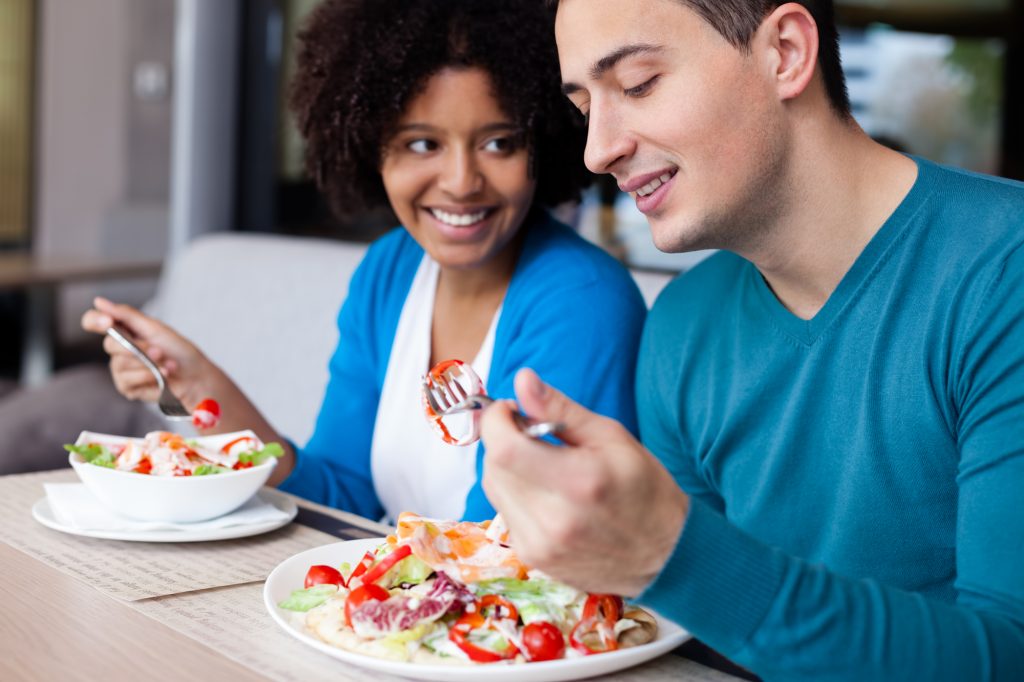Have you ever felt hungry, then lost your appetite because you were upset? Or did your food “sit like a lump” because you had eaten while agitated? Did you ever overeat to stuff down unpleasant feelings? The idea that your psychological state can influence digestion is now so familiar that it’s easy to lose sight of how amazing it is that your state-of-mind can influence digestion, and in turn, your well-being and weight. But it can.
With today’s global coronavirus pandemic, lockdown, social isolation, seismic economic shifts, and cultural unrest, it’s understandable that anxiety and stress (which I define as “perceived threat”) is the new normal for many of us. I’m mentioning this because my research on Whole Person Integrative Eating® and its link to overcoming overeating and overweight has revealed this unexpected finding: both the psychological and aesthetic atmosphere in which you eat influences overeating, and in turn, weight gain.1-3 I call this overeating style Unpleasant Atmosphere.1
(Note. The Unpleasant Atmosphere overeating style differs from Emotional Eating—another overeating style we’ve identified—in that Emotional Eating is often linked to eating for reasons other than having a healthy appetite, such as assuaging negative emotions—depression, anxiety, anger, boredom, etc.1

Psychological and Aesthetic Considerations
How amazing! Both the psychological and the aesthetic atmospheres in which you dine hold the power to influence your weight and well-being! What do I mean by psychological and aesthetic atmospheres?
Psychological surroundings. Have you ever eaten in an especially pleasant place, surrounded by supportive people, convivial conversation, and beautiful accoutrements? Perhaps friends took you to a welcoming restaurant for your birthday; because they’d organized the meal to celebrate you, the evening crackled with joy, conversation, and laughter.
The external mood, tone, and ambiance that surrounds you while you eat determines the psychological atmosphere. In the example of the birthday party, the atmosphere is celebratory and a source of pleasure. The milieu has an agreeable effect on you psychologically as you and your friends chat over a delicious meal. In response, your heart is open and your soul is singing.
But the psychological atmosphere can also be negative, stress-filled, and unpleasant. Have you ever eaten while being scolded or criticized? Or while driving during rush hour? Or eating at your desk, working at your computer, filled with stress because you’re on a tight deadline? If so, you’ve had the experience of eating in an unpleasant psychological atmosphere.
Aesthetic surroundings. The other key component of the Unpleasant Atmosphere overeating style1 is the aesthetics that surround you when you eat. Is the place in which you’re dining welcoming in appearance? Or are you sitting, for instance, on a hard, plastic bench, with your meal served on plastic plates? Or eating while munching a muffin as you fill your car at the gas station? Or while a siren in the street is screeching—unremittingly and loudly? These are examples of aesthetically unpleasant surroundings.
As a contrast, envision a place with an atmosphere that’s agreeable to you. When you visit a friend, you’re greeted by the aromas of freshly prepared food coming from the kitchen. Perhaps you take a break from work at your favorite local café to enjoy the brew that the barista makes for you personally. Or you’re surrounded by soft candlelight, which makes you aware of a wooden dining table’s lovely patina, peeking out from pleasing placemats.
Stress More, Eat More, Weigh More
Some scientists have explored the role that environment and emotions can play in the digestion process, and in turn your weight. Here are three studies that support the stress more, eat more dynamic:
#1: The mind-body link
Research by pioneering neuroscientist Candace B. Pert, PhD, gives us insights into why we may be driven to eat more and gain weight when we dining in unpleasant surroundings. The story starts with Pert’s discovery of substances called peptides, which reside not only in the brain but throughout your entire body. What’s unique about neuropeptides is that Pert discovered they are the “information carriers” between the brain and the digestive system that interpret our awareness of our surroundings when we eat—indeed, all aspects of our lives. Because of this, “the environment in which you eat has a lot to do with your emotional experience at mealtime,” writes Pert. In other words, eat in an unpleasant psychological and aesthetic atmosphere, and “it’s a kind of disintegration, a mind-body split that will lead to weight gain [italics mine] and disease conditions caused…by incomplete digestion,” says Pert.4
#2: Eating more at the movies
Here’s another reason you’re likely to eat more and gain weight when you consume food in an unpleasant psychological atmosphere: it also influences the quality (worse) and quantity (more) of food you eat. Researchers discovered this when they asked thirty subjects to watch Love Story, a sad movie that leads people to cry easily and often. As the study subjects watched the film, they ate 28 percent more buttered, salty popcorn (124.97 grams versus 97.97 grams) than they did while watching Sweet Home Alabama, a breezy comedy.5
#3: Health-full vs. unhealthy snacks
The same researchers found similar results with college students asked to read about children who died in a fire. As they read the heartbreaking news, they ate four times more M&M’s than raisins from nearby bowls of snacks. In contrast, when the same students read about a delightful chance reunion among four old friends, they didn’t turn to unhealthful food, but rather to healthful snacks.5
The message: if you want to eat less and weigh less, refrain from using the dinner table as a place to argue or scold or to think about unpleasant things.
Creating a Pleasant Eating Atmosphere
Here are some suggestions for making meals an affable dining experience:
Cherish china. When Oprah did a show on “anti-aging breakthroughs,” a weight-loss lifestyle was one of the topics. To highlight the elements of her successful weight loss, an audience member shared her personal success story. Along with moving more and choosing fresh food, the aesthetic atmosphere she created was part of her twenty-two-pound weight loss. “I put my portion [of food] on beautiful plates, with great style, lovely linens, crystal, [and] china, and enjoyed every morsel,” she said. “No more standing in the kitchen eating out of a little container.”6 Whenever possible, eat on quality plates with your best utensils, and sit down at a dining table to create an even more pleasing atmosphere.
 Put negative emotions on pause. Thanks to Candace Pert’s research on emotions and digestion, it’s safe to say that the psychological atmosphere in which you eat influences the way you metabolize food and, in turn, your weight and well-being. That’s why you’ll find it helpful to release toxic molecules of emotion when you eat. If you find yourself ruminating about something unpleasant, put your negative emotions on hold and press the pause button as you eat. Instead, think about something agreeable. You can always return to the problem later.
Put negative emotions on pause. Thanks to Candace Pert’s research on emotions and digestion, it’s safe to say that the psychological atmosphere in which you eat influences the way you metabolize food and, in turn, your weight and well-being. That’s why you’ll find it helpful to release toxic molecules of emotion when you eat. If you find yourself ruminating about something unpleasant, put your negative emotions on hold and press the pause button as you eat. Instead, think about something agreeable. You can always return to the problem later.
Redirect the conversation. If people with whom you’re dining are more negative than positive, try to redirect the conversation by asking them to share something that’s working well or is enjoyable in their lives. Consider sharing—or creating—your own “delightful-environs-while-eating” stories or experiences. For instance, envision or invite friends and family to share a fall picnic, surrounded by the colors of the season in the leaves and in the deep orange of pumpkin soup. Or think about and discuss the soothing comfort of a homemade stew eaten in winter as candlelight flickers.
The Takeaway
The bottom line of our Whole Person Integrative Eating® findings1-3 is this: The atmosphere in which you eat influences overeating and weight, meaning, dining in psychologically and aesthetically pleasing surroundings matters to your waistline. Commit to taking charge by “designing” the most pleasant ambiance possible each time you eat.
Article originally printed on integrativeeating.com. Reprinted with permission.
Deborah Kesten, M.P.H., is an award-winning author, specializing in preventing and reversing obesity and heart disease. Her expertise includes the influence of epigenetics and diet on health, Lifestyle Medicine, and research on the Whole Person Integrative Eating dietary lifestyle to treat overeating, overweight, and obesity. She and her husband, behavioral scientist Larry Scherwitz, Ph.D., collaborate on research and writing projects. Her latest book, “Whole Person Integrative Eating” was named the “Winner” in the Health category by the 2020 Book Excellence Awards.
References
- Scherwitz and D. Kesten, “Seven Eating Styles Linked to Overeating, Overweight, and Obesity,” Explore: The Journal of Science and Healing 1, no. 5 (2005): 342–59.
- Kesten D, Scherwitz L, “Whole Person Integrative Eating: A Program for Treating Overeating, Overweight, and Obesity,” Integrative Medicine: A Clinician’s Journal 14, 5 (October/November 2015): 42-50.
- Deborah Kesten and Larry Scherwitz, Whole Person Integrative Eating: A Dietary Lifestyle to Treat the Root Causes of Overeating, Overweight, and Obesity (Amherst, MA: White River Press, 2020).
- Candace B. Pert, Molecules of Emotion: Why You Feel the Way You Feel (New York: Scribner, 1997), 297–98.
- Garg, B. Wansink, and J. Jeffrey, “The Influence of Incidental Affect on Consumers’ Food Intake,” Journal of Marketing 71, no. 1 (2007), 194.
- Christine Aaron in conversation with author Mireille Guiliano and Oprah Winfrey, “Anti-Aging Breakthroughs” transcript, The Oprah Winfrey Show, May 17, 2005 (Livingston, NJ: Burrelle’s Information Services), 21.
- oodism Rx: Get Fresh,” (White River Press: Amherst, MA), 2020.

